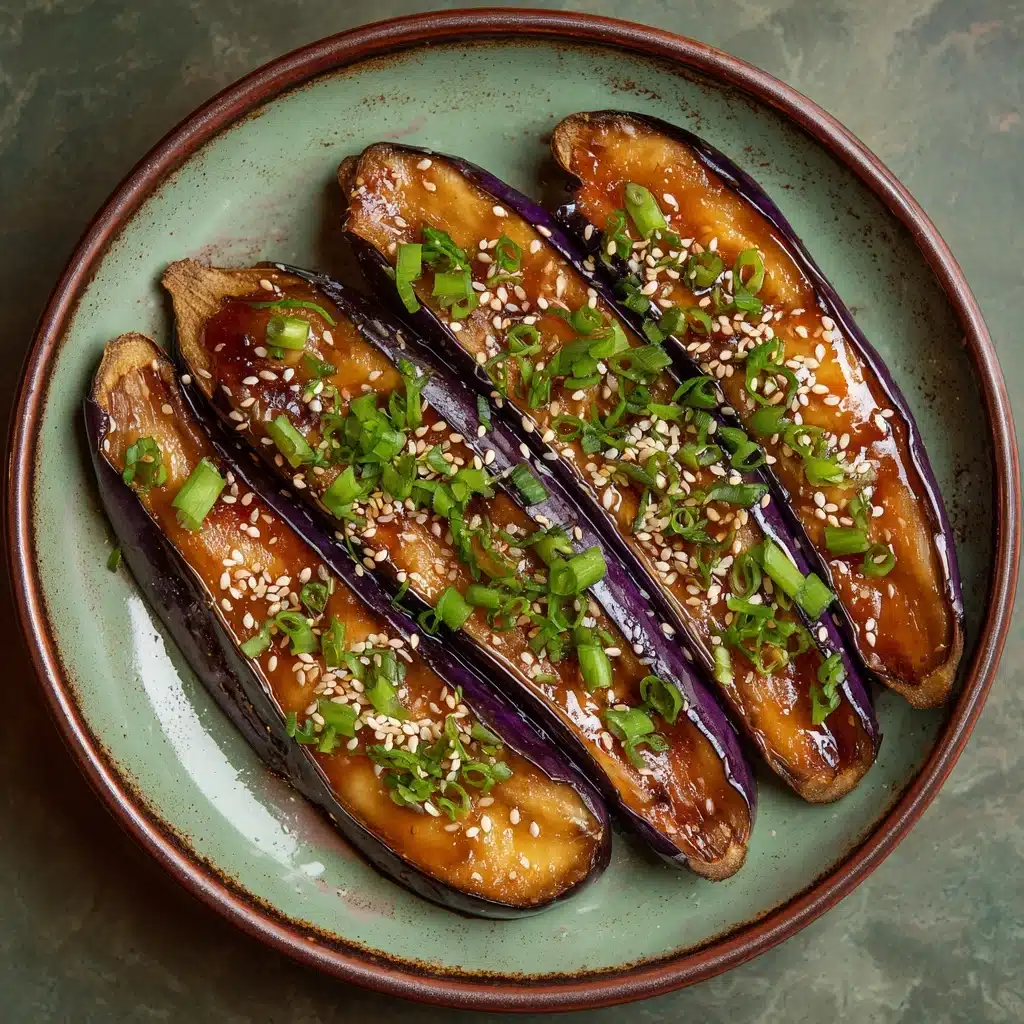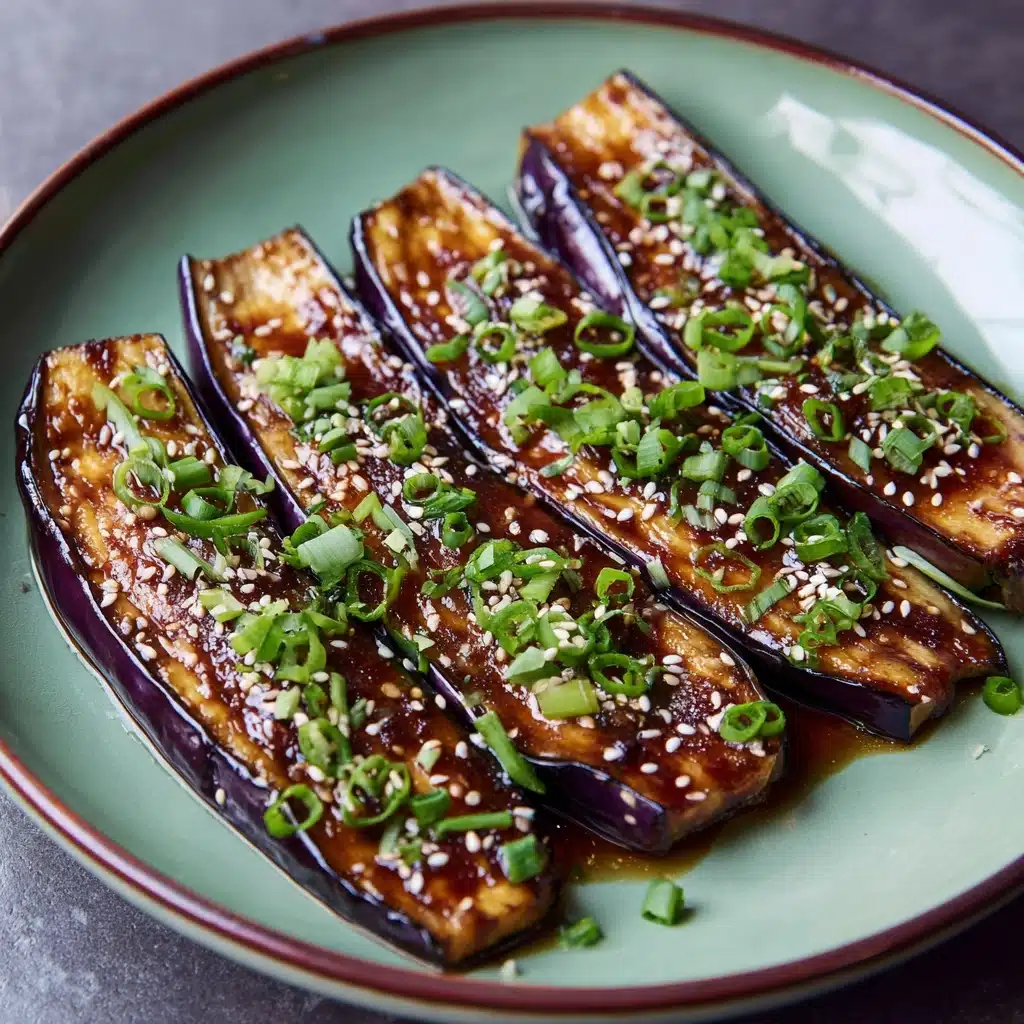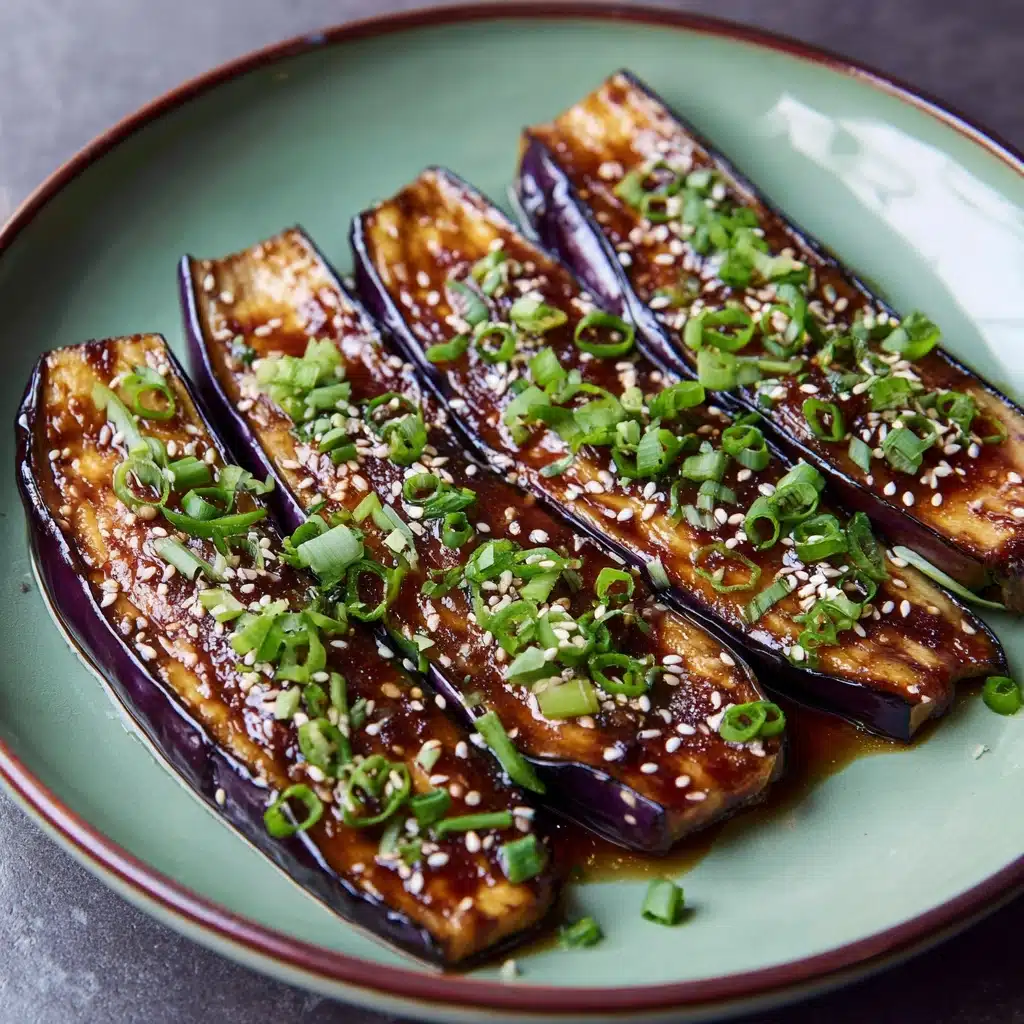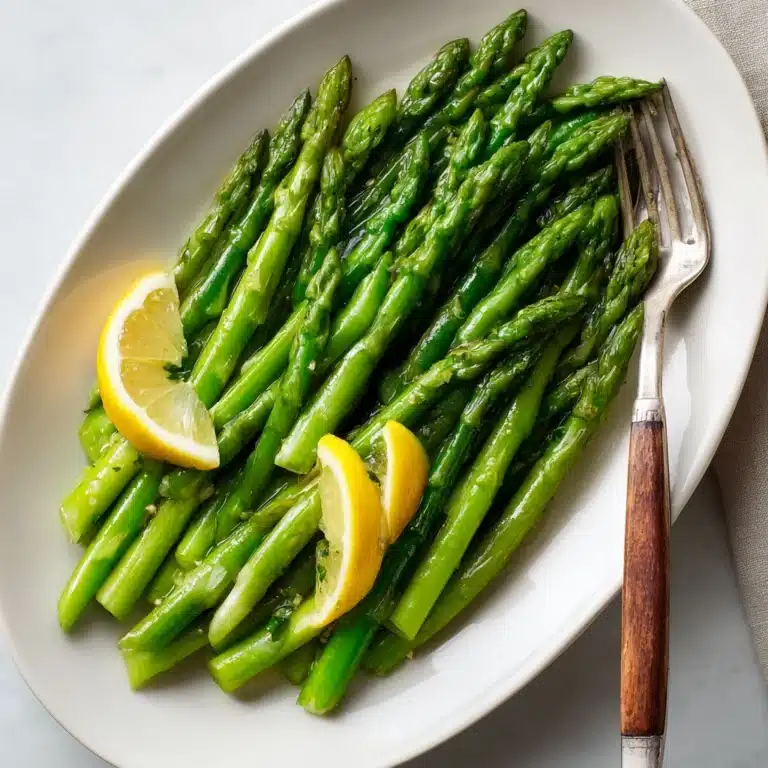If you’re looking to bring a touch of Japanese comfort and a flavor-packed bite to your table, this Miso-Glazed Eggplant (Nasu Dengaku) Recipe is a knockout. The combination of roasted, tender eggplant brushed with a savory-sweet miso glaze delivers an irresistible umami punch and gorgeous caramelized finish. Whether you’re a longtime fan of Japanese cuisine Side Dish.

Ingredients You’ll Need
These beautifully minimal ingredients are the backbone of the dish, and each one plays a big role in the final flavor symphony. With just a few pantry staples, you’ll be celebrating Japanese eggplant in its absolute best form.
- Japanese or Chinese eggplants (2 medium): These varieties are prized for their slender shape, tender skin, and sweet flesh that soak up all the miso goodness.
- Vegetable oil (1 tablespoon): This encourages golden, melt-in-your-mouth roasted eggplant with a delicate crisp edge.
- White miso paste (2 tablespoons): This mildly sweet paste makes up the heart and soul of the miso glaze, giving it that essential umami depth.
- Mirin (1 tablespoon): A touch of Japanese sweet rice wine adds lovely sweetness and gloss to the glaze.
- Sake (1 tablespoon): Sake softens the flavors, rounding out the miso’s saltiness for a harmonized glaze.
- Sugar (1 tablespoon): Extra sweetness balances the savory, creating that signature dengaku flavor profile.
- Soy sauce (1 teaspoon): Just a hint heightens the overall umami and brings a little color to the glaze.
- Toasted sesame seeds (for garnish): A final sprinkle boosts both nutty aroma and visual appeal.
- Sliced green onions (for garnish): Bright, fresh, and a pop of color on top of that glossy miso coating.
How to Make Miso-Glazed Eggplant (Nasu Dengaku) Recipe
Step 1: Prep the Eggplants
Start by preheating your oven to 400°F (200°C) and lining a baking sheet with parchment or greasing it lightly. Then, grab those beautiful eggplants, slice them lengthwise, and score the flesh in a diamond pattern—take care not to cut through the skin. This gentle scoring isn’t just for looks—it allows the glaze to settle into every nook, making each bite sing with flavor.
Step 2: Brush and Roast
Brush the cut sides generously with vegetable oil, then place the halves cut-side up on your prepared baking sheet. Roast away for 20 to 25 minutes, until the flesh is buttery-tender and the edges are golden. At this point, the aroma in your kitchen will already be spectacular!
Step 3: Mix the Miso Glaze
While your eggplant roasts, let’s whip up the glaze. In a small saucepan over medium heat, combine white miso paste, mirin, sake, sugar, and soy sauce. Whisk until everything is silky-smooth, then let it cook for 2 to 3 minutes until slightly thickened. You’re looking for a pourable, glossy glaze that smells almost too good to wait for.
Step 4: Glaze and Broil
Once your eggplants are tender, pull them from the oven and switch your setting to broil. Spoon the luscious miso glaze generously over each eggplant half, spreading it edge to edge. Pop them back in the oven for 2 to 3 minutes, keeping a close eye—broil until that glaze bubbles and caramelizes for a savory-sweet topping you’ll want to eat right off the spoon.
Step 5: Garnish and Serve
Remove the now-glorious Miso-Glazed Eggplant (Nasu Dengaku) Recipe from the oven, and shower them with toasted sesame seeds and bright green onions. Serve hot or warm—each plate promises silky eggplant and that sticky, irresistible miso crust.
How to Serve Miso-Glazed Eggplant (Nasu Dengaku) Recipe

Garnishes
Never underestimate the power of a good garnish. A scattering of toasted sesame seeds adds deeply nutty notes, while freshly sliced green onions bring just the right bite and color contrast. If you’re feeling inspired, try a sprinkle of shichimi togarashi (Japanese chili pepper) for a subtle kick.
Side Dishes
This Miso-Glazed Eggplant (Nasu Dengaku) Recipe loves good company. Steamed rice is the ultimate pairing for soaking up all those rich flavors, but it also shines next to simple sautéed greens, miso soup, or a crisp cucumber salad. For a more filling meal, offer it alongside grilled tofu or lightly dressed soba noodles.
Creative Ways to Present
Why not serve the dish family-style on a long platter, or as an elegant appetizer at your next dinner party? You can even cube cooled miso-glazed eggplant and tuck it into sushi rolls, small rice bowls, or lettuce wraps for unexpected alternatives that still showcase all that glorious glaze.
Make Ahead and Storage
Storing Leftovers
Any leftover eggplant can be kept in an airtight container in the refrigerator for up to 3 days. The flavors continue to meld as it sits, so the Miso-Glazed Eggplant (Nasu Dengaku) Recipe is just as tasty the next day, maybe even more so.
Freezing
While eggplant’s texture can soften even more after freezing, you can pop cooled glazed eggplant portions into freezer-safe containers for up to one month. For best quality, thaw overnight in the fridge before reheating—just note that the glaze may be slightly less glossy upon thawing, but the flavor holds up beautifully.
Reheating
To bring your miso-glazed eggplant back to life, warm it gently in a 350°F (175°C) oven for about 10 minutes, or until heated through. You can also microwave individual servings for a quick lunch—just cover to keep moisture in and prevent drying out.
FAQs
Can I use regular globe eggplant instead of Japanese eggplant?
Yes, you can substitute with regular globe eggplant if Japanese or Chinese eggplant isn’t available. Just slice them into thinner planks so they cook evenly and still achieve that silky, roasted texture.
Is the miso glaze gluten-free?
The glaze is gluten-free as long as your soy sauce is certified gluten-free. Double-check your miso paste and other condiments to ensure they suit your dietary needs.
What can I use instead of sake?
If you don’t have sake on hand, dry sherry or a splash of white wine works nicely, or simply increase the mirin slightly for extra sweetness without alcohol.
Can I make this dish vegan?
This Miso-Glazed Eggplant (Nasu Dengaku) Recipe is naturally vegetarian and can be completely vegan. Just confirm that your miso paste is vegan and use plant-based substitutes where needed.
How do I keep the eggplant from turning soggy?
The key is roasting the eggplant cut side up with enough heat and just enough oil to encourage browning, not steaming. Scoring the flesh also helps it cook evenly and prevents sogginess. Always serve soon after broiling for the best texture!
Final Thoughts
Don’t wait for a special occasion to treat yourself to the rich, savory-sweet flavors of this Miso-Glazed Eggplant (Nasu Dengaku) Recipe. It’s easy, satisfying, and guaranteed to impress everyone at your table. Give it a try—you might just find it becomes a new staple in your home kitchen!
Print
Miso-Glazed Eggplant (Nasu Dengaku) Recipe
- Total Time: 40 minutes
- Yield: 4 servings 1x
- Diet: Vegetarian, Gluten-Free
Description
Enjoy the umami-rich flavors of this classic Japanese dish with a modern twist. Miso-glazed eggplant, known as Nasu Dengaku, is a delicious and satisfying vegetarian dish that makes a perfect side or appetizer.
Ingredients
Eggplant:
- 2 medium Japanese or Chinese eggplants
- 1 tablespoon vegetable oil
Miso Glaze:
- 2 tablespoons white miso paste
- 1 tablespoon mirin
- 1 tablespoon sake
- 1 tablespoon sugar
- 1 teaspoon soy sauce
Garnish:
- toasted sesame seeds (for garnish)
- sliced green onions (for garnish)
Instructions
- Preheat the oven: Preheat the oven to 400°F (200°C) and prepare a baking sheet with parchment paper or oil.
- Prepare the eggplant: Slice the eggplants in half, score the flesh, brush with oil, and place cut-side up on the baking sheet.
- Roast the eggplant: Roast for 20-25 minutes until tender and golden.
- Make the miso glaze: Combine miso, mirin, sake, sugar, and soy sauce in a saucepan, cook until thickened.
- Glaze and broil: Spoon the miso glaze over the eggplants, broil for 2-3 minutes until bubbly.
- Finish and serve: Sprinkle with sesame seeds and green onions before serving hot or warm.
Notes
- This dish is great with steamed rice or as a flavorful side.
- Japanese eggplants are recommended for their tender texture and mild taste, but Italian eggplants can be used if sliced thinly.
- Prep Time: 10 minutes
- Cook Time: 30 minutes
- Category: Side Dish
- Method: Roasting, Broiling
- Cuisine: Japanese
Nutrition
- Serving Size: ½ eggplant
- Calories: 130
- Sugar: 7g
- Sodium: 450mg
- Fat: 6g
- Saturated Fat: 1g
- Unsaturated Fat: 5g
- Trans Fat: 0g
- Carbohydrates: 15g
- Fiber: 3g
- Protein: 3g
- Cholesterol: 0mg







